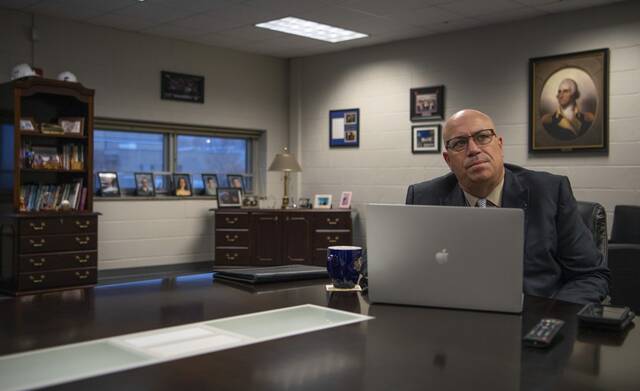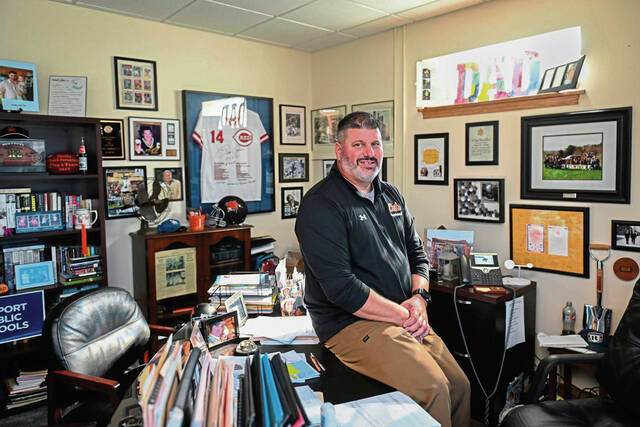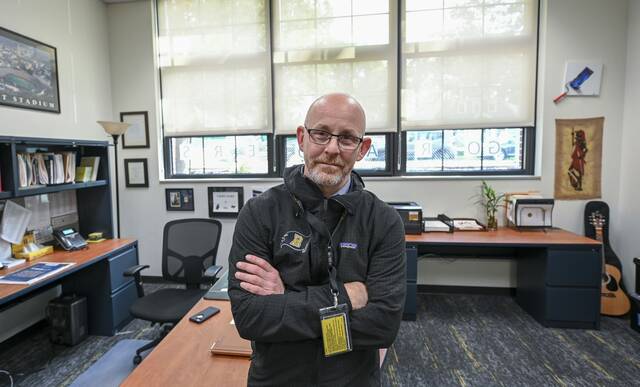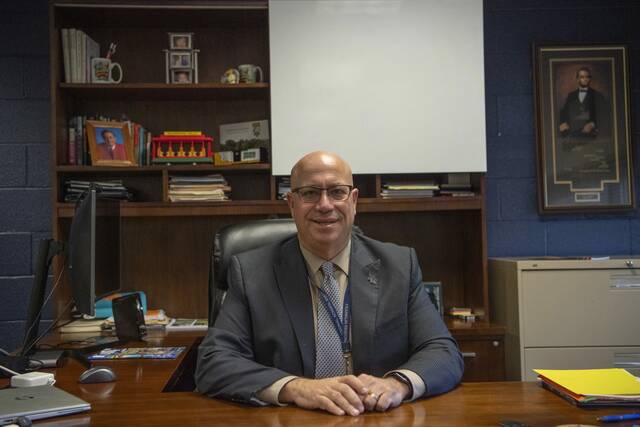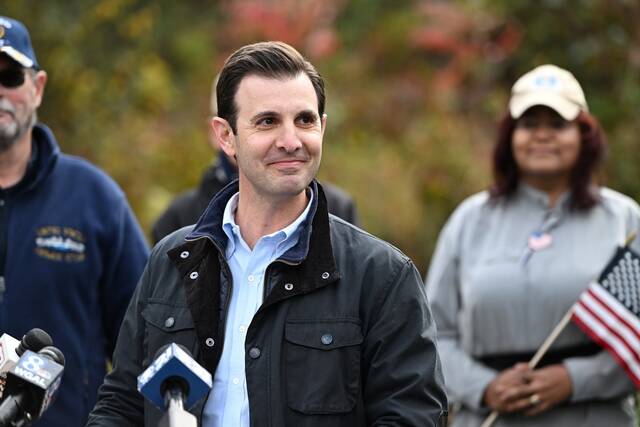Superintendents of two of the largest school districts in Westmoreland County — Hempfield Area’s Tammy Wolicki and Norwin’s Jeff Taylor — announced last week they would be leaving their posts.
Their departures come on the heels of Leechburg Area Superintendent Tiffany Nix’s resignation. She announced in December that she would leave for an assistant superintendent role in the Penn-Trafford School District.
All three had been in their posts for several years: Nix since 2016, Wolicki since 2017 and Taylor since 2019. And, at least in the cases of Wolicki and Taylor, the news caught the community off guard.
Maybe it shouldn’t have.
Almost 35% of all superintendents in Pennsylvania have changed jobs within the past two years, according to data from the Pennsylvania Association of School Administrators. Several superintendents told TribLive that’s a byproduct of the microscope under which they work. But it also has created demand that has driven up salaries.
Superintendent turnover has become one of the main crises in public education, and it’s only intensifying, said Franklin Regional Superintendent Gennaro Piraino, who is president-elect of PASA.
More than 15 superintendent positions are open statewide — a number that’s usually not seen until February and March, which is the “busy season” for such openings, Piraino said. But during the past few years, it has become normal to see more openings ahead of the busy season, he said.
Contracted post
A superintendent is hired on a contract basis and answers to the school board. That can be trying as school boards have become more politicized and their makeup can change as often as every two years because of elections.
A longtime superintendent could be ousted if he or she is not supported by the majority of the board, no matter their track record, Piraino said.
“I think the job of a superintendent is more difficult than it’s ever been,” said PASA Executive Director Sherri Smith.
She cited issues such as politics, concerns about students’ mental health and recovery from the covid-19 pandemic.
“Post-pandemic, some of the political difficulties that we’ve seen out of (the) local government level — many superintendents went through difficult years (and) lost their appetite,” Smith said.
Although superintendents have been struggling with the politicization of school boards, Smith said she believes the pandemic exacerbated the issues, causing higher turnover rates. Smith said some superintendents come out of retirement to serve a few months in a district while a school board tries to find a replacement.
Such is the case at Leechburg. On Wednesday, the school board hired Peter Emery D’Arcangelo as acting superintendent. D’Arcangelo served as superintendent at Franklin Regional from 2004 through 2015, when he retired. At Leechburg, he will help in finding a permanent successor to Nix.
There is some encouraging news, though, Smith said.
As of 2023, 87 of Pennsylvania’s 500 superintendents have been with the same district for 10 or more years, compared to 227 who have been with the same district for five years, according to PASA. Smith said those numbers are up from previous years.
No typical day
Greater Latrobe Superintendent Mike Porembka said there isn’t a typical day on the job — and it’s difficult to stick to a plan. He is lucky, he said, if he gets even one item done on his to-do list.
Once a week, he said, he returns to his office in the administration building after his family members go to sleep to get more work done. He said he usually gets there around 9 p.m. and stays sometimes until 2 or 3 a.m. to catch up on emails or work on projects uninterrupted.
“There’s nobody here,” said Porembka, 48, of Unity. “My phone’s not going to ring.”
Being a superintendent is about sacrifice, he said. Some weeks he is unable to see his two kids, who go to school in the district, for more than 20 minutes before they go to sleep.
“When I come into the office, my daughter’s question is, ‘How long are you going to be tonight?’” Porembka said. “She’s going to sleep, but she knows that I’m not there.”
He stressed the unpredictability that comes with the position.
“I think there are some people who are my age with an 11-year-old or a 10-year-old, and they’re not willing to leave the baseball game like I did (last fall) to go to a fundraising dinner,” Porembka said. “They’re not willing to leave my daughter’s soccer game like I did (last fall) because we had an issue to deal with in the school district.”
Increasing salaries
Still, there are perks — notably the rising salaries.
The average salary for a superintendent in Pennsylvania was about $160,000 during the 2022-23 school year, according to the state Department of Education. That’s an almost 12% increase from five years earlier, when the average was about $143,000.
Supply and demand has contributed to the rise, Smith said.
In Allegheny County, the average superintendent salary in 2022-23 was about $177,000, and in Westmoreland County, it was about $156,000. Five years earlier, those salaries were about $152,000 and $148,000, respectively.
Salaries in some districts have decreased, which is indicative of a board hiring someone with little to no superintendent experience, Smith said. Districts usually start such a hire at a salary similar to the starting salary of their predecessor, she said.
Although 2023 resembled 2022, the number of applicants for available positions is dropping, Smith said. Applicants who do apply often have less experience.
“We had a tremendous amount of turnover within the last three, four years,” she said.
Waning interest
When Piraino, 50, of Murrysville, applied for his position at Franklin Regional 11 years ago, he said he heard there were about 45 applicants.
Now, he said, school districts are getting three to eight candidates for the job.
“And some are getting eliminated very early because they don’t have the experience,” he said.
Educators once were required to have experience as a teacher and administrator to become a superintendent, but because fewer people are pursuing a career in education and state law has changed, that is no longer the case.
The Pennsylvania Public School Code now states that if someone has a graduate degree in business, finance, management or law and has at least four years of experience in one of those fields, they can become a school superintendent.
Because there are fewer job candidates, school districts have tried to poach established superintendents by offering higher salaries, Piraino said.
“Now, not a job comes open … that the search firm doesn’t call me and ask me if I’m willing to … entertain an interview,” he said.
Piraino said he has no desire to leave his current post, but for candidates wishing for higher pay, jumping to another district can be attractive.
As of 2023, the average annual salary increase when changing jobs was 14.8%, but wage growth was 5.8% for those who remain at their current job, according to the career planning site Zippia.
Porembka, who has been at Greater Latrobe for 25 years and superintendent since 2022, said he believes fewer people are willing to deal with the demands that come with the administrative position.
“The demands on a superintendent and what they’re required to do (are) always changing,” he said. “There’s always more for you to do.”
Rising salaries in industries outside of education also could be contributing to a lack of interest in a superintendent job, Porembka said.
“There aren’t people breaking down doors to do this job,” he said. “There is no job in this district that doesn’t have some sort of pressure on it. I just think that there are some folks (who) don’t want that type of pressurized environment.”
Retaining talent
Riverview School District Superintendent Neil English also noted the shortage of qualified individuals who want to be superintendents.
“It’s a very, very stressful job,” he said. “There’s more discontent in our community. … It’s harder to build trust with the community.”
Those who might consider applying are often wary of stress that comes with the position, said English, 49, of Pine. He has worked for eight years at Riverview and started as superintendent in 2020.
English said he became a superintendent to better serve the district and community. He said his job includes running curriculum meetings, calling parents, advocacy, understanding the political landscape, being aware of legislation and litigation and “putting out fires.”
“In my opinion, most of the superintendents I know are just like me,” he said. “They’re people (who) came into the field to make a difference, make a positive impact.”
His day can range from focusing on professional, leadership or workforce development; safety and security; parents, school board members and teachers; political issues; and even wetlands and environmental issues involving construction projects, he said.
The shortage of people interested in the position, and the current transient nature of it, can lead to a lack of consistency in senior leadership, English said.
“Having some consistency in the district is so important,” he said.
Job stresses
Some leave the position because they misjudged the required involvement, said Porembka. Others leave because they are no longer welcome in their district.
“But that’s a reality that I think we all accept when we come into it,” he said.
Piraino said he believes his experiences at Franklin Regional have strengthened his relationship with the community.
“I bought a home here. I moved my family here. My kids are in school here and so … for someone like me, that investment is all in,” he said.
Every school board he has worked with has engaged in civil discourse and respectful dialogue, Piraino said, even when members haven’t all agreed.
“That doesn’t exist everywhere,” he said. “And I think that disrespect or that an inability to have civil discourse in today’s society makes the superintendency one of the most difficult jobs in the country.”
Despite the challenges, Piraino said he couldn’t see himself doing anything else.
“It has been worth that sacrifice … and I think my family realizes that sacrifice and why we make it,” he said.
Porembka agreed.
“This is a calling for me,” he said. “I feel like the job that I do is making a difference for the future.”


